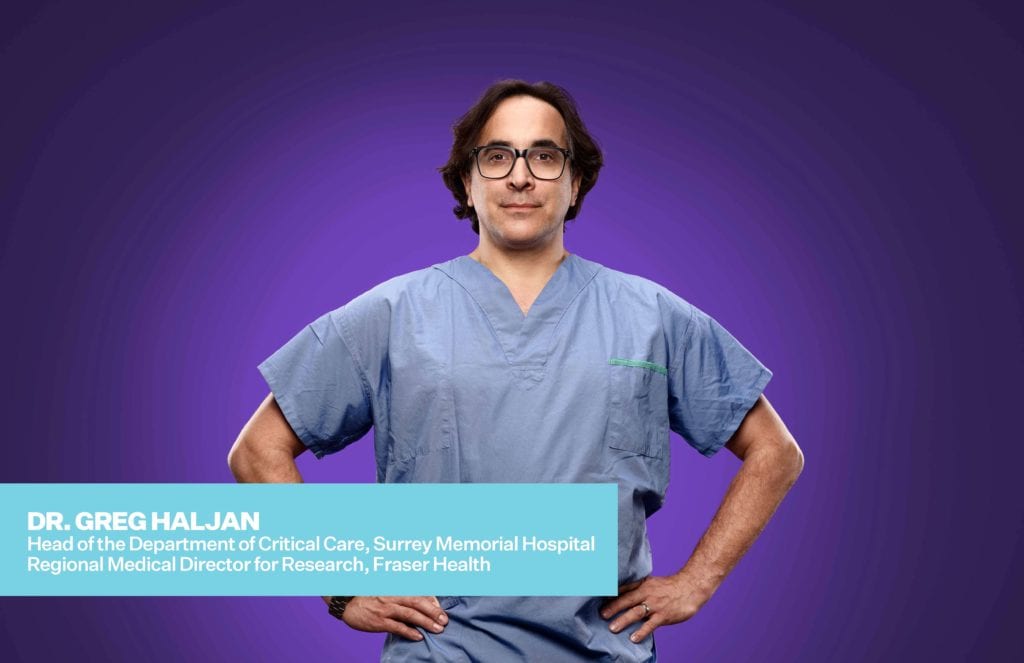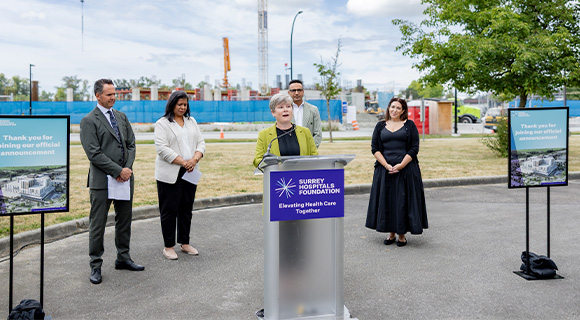 With incredible donor support, Surrey Hospitals Foundation is proud to be contributing $175,000 in COVID-19 research taking place right here in Surrey.
With incredible donor support, Surrey Hospitals Foundation is proud to be contributing $175,000 in COVID-19 research taking place right here in Surrey.
An investment of $150,000 from our COVID-19 Response Fund has been matched by a grant from the prestigious Michael Smith Foundation for Health Research (MSFHR). The funding enables the hiring of an essential research team including a Clinical Research Coordinator, Clinical Research Nurse, and a Clinical Research Assistant at Surrey Memorial Hospital, headed by Clinical Research Lead Christopher Condin, under the guidance of Kate Keetch, Director of Evaluation and Research Services at Fraser Health.
With original seed funding of $25,000 from TELUS Friendly Future Foundation, the Surrey Hospitals Foundation is also helping fund a COVID-19 research study on the viability of a virtual rehabilitation clinic.
Dr. Haljan is the head of Surrey Memorial Hospital’s critical care department and is also the Regional Medical Director of Research for Fraser Health.
He will be leading the COVID-19 research study to examine whether a multi-disciplinary virtual recovery program providing pulmonary rehabilitation for COVID-19 survivors improves rehospitalization, patient quality of life and health outcomes.
He hopes to launch a COVID-19 virtual rehabilitation program at Surrey Memorial Hospital led by critical care physicians and experts. It has the potential to transform outcomes both during recovery from the pandemic and beyond, and to create measurable improvements in the quality of patients’ lives by extending the impact and reach of physiotherapy services and post-discharge care.
“Research has shown that 17 per cent survivors of similar critical illnesses, including SARS and influenza etc., are re-admitted to hospital within one month of discharge, 30 per cent by three months and 40 per cent by six months, and COVID-19 numbers will be very similar,” says Dr. Haljan. “We need to prevent the onset of COVID-19 hospital re-admissions by developing a patient-centric, virtual critical care rehabilitation program led by critical care physicians and experts,” explains Dr. Haljan. “This high-level rehabilitation program doesn’t just help with the primary health condition, it also focuses on helping patients improve their mental well-being, which reduces the likelihood of them suffering from post-traumatic stress disorder (PTSD) and improves cognitive function.”
“In the midst of this second wave of COVID-19, and given that Fraser Health has the highest number of cases, it is essential that we build up our COVID-19 research capacity so that we can contribute to vital evidence-based knowledge needed to combat the pandemic,” says Dr. Kate Keetch,Director, Department of Evaluation and Research Services at Fraser Health. “Our critical care physicians, including Dr. Haljan, are the most experienced in COVID-19 treatment and care, and helping support them to do cutting-edge, patient-centred research and knowledge translation as part of their clinical care, is why I head into work every morning.”
Previous research indicates that early mobility and rehabilitation, after being discharged from hospital, reduce mortality and acute care utilization in multiple critical illness survivor cohorts. Even 14 days of quarantine without hospitalization impacts fitness and mobility. Pulmonary rehabilitation improves the full spectrum of cardiopulmonary, cardiovascular, neuromuscular, and mental health domains, including surprisingly, depression, anxiety and cognition.(McCarthy B et al., Pulmonary rehabilitation for chronic obstructive pulmonary disease. Cochrane Database Syst Rev. 2015 Feb 23;(2):CD003793)
Media Stories:


